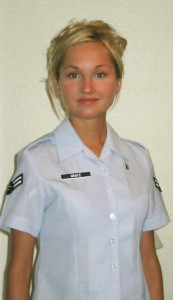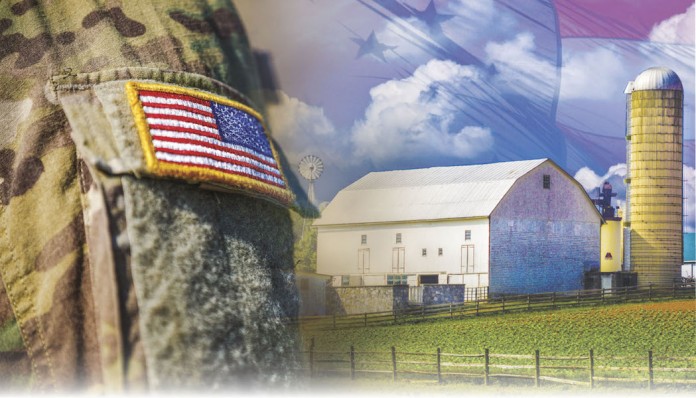(Editor’s note: Ivory Harlow farms with her husband, Kip, in southern Ohio and provides farming advice columns every Friday on farmanddairy.com. Both Ivory and Kip served in the United States Air Force before moving to Ohio to start their small goat and hay operation. We asked Ivory about her time in the service and the programs available to military veterans interested in farming.)

Q. Where did you grow up?
A. I was born in Elk River, Minnesota. My mom had a horse hobby farm where she ran an agritourism operation. She held children’s parties and events and used it for a photography venue. I helped out with that up until I graduated high school.
Q. When did you join the military?
I had to sit on my hands until I was 18 to be eligible to enlist. I wanted to go overseas and see the world. I wanted to go into the Air Force and I had dreams of going to Italy and all over.
I enlisted in the military just weeks after graduating high school. They ended up sending me to Texas, where I was stationed at Lackland Air Force Base, in San Antonio. I spent my entire enlistment there.
Q. How long did you serve?

I spent four years in the Air Force, from 2000-2004. In 2001, I met my husband, Kip Harlow, who was also serving in the Air Force at the time. I was a logistics material manager — working with medical equipment — and he was a biomedical engineer. We were in the same department.
Kip grew up raising hogs and eventually cattle in Llano, Texas. Even when he was on the Air Force base, (Kip) would take time to go home and work cattle on the ranch. That was his master plan (to someday run his own farm). Kip served eight years — a combination of active duty and International Guard.
Q. How did you end up in Ohio?
When both of our enlistments were up, we knew we wanted to get back to those rural roots. The base was like a subdivision, it was like torture for us.
My husband continued working as biomedical engineer and working with Veteran Affairs. Our only options (for relocation) were Providence, Rhode Island, or Chillicothe, Ohio.
Chillicothe looked much more promising (for farmland) than Providence. We’ve been in Ohio for about five years now.

Q. What do you farm?
Dickie Bird Farm officially became an entity in 2012. We raise Boer goats for exhibition and breeding stock, and meat. We normally sell through United Producers but we are looking into direct meat sales.
We also have a forage operation and sell small square bales of hay. We spend our summers baling a lot of hay and winters with goat babies running around.
Q. Did you use any farmer-veteran programs to get started?
Related: Honoring our veterans, our heroes
We didn’t use any special funding to get started, but we became members of the Farmer Veteran Coalition and became certified in the Homegrown by Heroes program in 2012. It has helped with marketing.
Q. What farmer veteran groups and conferences have you been a part of?
The Farmer Veteran Coalition has helped us be successful and the Homegrown by Heroes provides marketing opportunities. It’s a growing group and is even a good group for those just with rural lifestyle interests.

In the spring, I attended a women’s Farmer Veteran Coalition conference in New York. It was a two-day conference focused on sustainable production methods and marketing. I thought, how many (women farmer veterans) could their be, but there was a lot.
At the end of November, the Farmer Veteran Coalition will be holding the Farmer Veteran Stakeholders Conference in Michigan. The conference is Nov. 30-Dec. 2 and features educational tracks, farm visits, speakers and networking.
We are going to start getting an Ohio chapter of the Farmer Veterans Coalition together this spring. Right now, we are meeting with other chapters to get ideas. If people are interested in being a part of that they can email me at farmer@dickiebirdfarmer.com.
We are not sure what it will look like yet. Some states use it just for networking, others for marketing. It can be whatever the group wants it to be.
Q. Why are farmer veteran programs so important to you?
One of the real values is getting back into that military family. Farming is kind of a lonely profession. By attending these conferences and being a part of these groups, you are surrounded by people with a shared background.
There is a feeling you get when you have been in the military and you see fellow military men and women again. Even if I don’t know them, when I get on base again, I feel like I should. There is something about having that shared experience. You feel like you know everybody, when you don’t.
Ivory Harlow provides a list of resources for military veterans interested in farming as a career in her column here.











